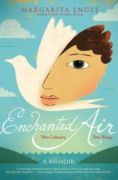
Enchanted Air: Two Cultures, Two Wings: A Memoir
Written by Margarita Engle
Atheneum, 2015, 193 pp.
ISBN: 9781481435222
In her author’s note, poet Margarita Engle, who has published many award-winning novels in verse, shares that she never thought she would be “brave enough to write about (her) life as a Cuban American child growing up in the United States during the hostilities of the Cold War” (p. 191). She explains that she framed the poems in this book in terms of travel as a “magical experience” that help travelers “see how others live” and teaches compassion.
The author paints poems with beautiful language and rich imagery as she describes her familial connection to Cuban people and culture. She also shares her heart-felt confusion and anger as she lives through the sorrows of separation from half of her family during the Cold War and experiences discrimination as a Cuban American. From the first poem that describes her first airplane flight to meet her mother’s family in Cuba to the last poem in which she makes a final plea for normalizing diplomatic relations between her two countries, her verses extend the travel imagery to emphasize her hope for soaring on wings to unite her family and both halves of her identity.
The poems portray the first fourteen years of the poet’s life. Margarita’s family lives in Los Angeles near her Dad’s Ukrainian-Jewish relatives who fled Europe from Holocaust pogroms and tell brief, vague stories of leaving their loved ones behind. In contrast, Margarita’s Mami recites Spanish poetry and fills the air in her childhood home with vivid stories of relatives who live in Cuba on the topical island where her mother grew up. Engle writes, “Apparently, the length/of a grown-up’s/growing-up story/is determined/by the difference/between immigration/and escape” (p. 29).
When young Margarita visits Cuba, she discovers her “second self, the invisible twin who belongs to this wild tropical farm instead of a modern city” (p. 31). For several summers, the family visits the island, but when it becomes difficult, they travel to Mexico instead. In a poem called “What Am I?,” the young teen Margarita wrestles with her identity. When the tensions between the United States and Cuba are escalating, she shares a memory of feeling guilty when a teacher remarks: “WE WERE LIKE SANTA CLAUS/ON THAT POOR LITTLE ISLAND” (p. 43). Then, the teacher whispers directly into Margarita’s ear to personalize her accusation that Cubans are ungrateful. After FBI agents come to their home to question Margarita’s mother, she writes about this experience in the poem titled “Investigated.” Later, she deals with the terror of the Cuban Missile Crisis and finds hope by immersing herself in books. In “My Library Life,” she writes: “I never find any books/about the beautiful green/crocodile-shaped island/that throbs/at the center of my being,/like a living creature,/half heart/and half beast” (p. 129).
With lovely language, an insider’s view of growing up in two cultures, and many historical and political issues to question, Margarita Engle’s Enchanted Air Two Cultures, Two Wings: A Memoir is a powerful gift to readers. Educators will be grateful that she chose to write and publish it at this time in the history of U.S.-Cuban relations. The book includes a Cold War time line as well as the author’s note and a poem by Cuban poet José Martí that Margarita remembers her mother reciting by heart.
Leaving Glorytown: One Boy’s Struggle under Castro written by Eduardo F. Calcines (2009) would be a perfect book to pair with Enchanted Air. (See WOW Review, 1 (4). During the Cuban missile crisis and onset of the Castro regime, Margarita Engle worries about her Cuban relatives and experiences a profound sense of loss of connection to her island heritage. Eduardo Calcines’ boyhood experiences living under the Castro regime show the same time period from another perspective. Readers of both books will experience how these two young people deal emotionally with adult actions and the politics of their time.
Margarita Engle’s previous novels in verse have taken a longer view of Cuban history: The Surrender Tree: Poems of Cuba’s Struggle for Freedom (2008), Tropical Secrets: Holocaust Refugees in Cuba (2009), The Firefly Letters: A Suffragette’s Journey to Cuba (2011), and The Lightning Dreamer: Cuba’s Greatest Abolitionist (2013). Along with Enchanted Air, these titles create a rich historical novel text set that could help today’s readers learn more about Cuba, particularly since the start of normalizing relations between Cuba and the U.S. is a current events topic.
Judi Moreillon, School of Library and Information Studies, Texas Woman’s University, Denton, TX
WOW Review, Volume VIII, Issue 3 by Worlds of Words is licensed under a Creative Commons Attribution-NonCommercial-ShareAlike 4.0 International License. Based on work at https://wowlit.org/on-line-publications/review/volumeviii-3/
